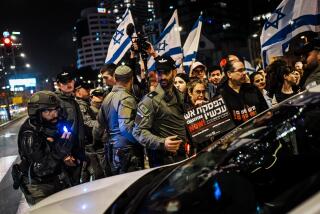Israel to Keep on Expanding Settlements in East Jerusalem, Levy Informs Baker : Confrontation: The foreign minister’s letter of clarification is certain to renew friction with U.S.
- Share via
JERUSALEM — Israel will continue to expand settlements in annexed districts of Jerusalem, as well as in the occupied West Bank and Gaza Strip, despite persistent objections from Washington, Israel’s Foreign Minister David Levy said Thursday in a letter to Secretary of State James A. Baker III.
The letter is expected to renew the friction that appeared to have receded with recent pledges by Israel to alter its settlement policies.
In early October, Israel promised not to use American aid money to build new neighborhoods on land seized by Israel in the Arab-Israeli War of 1967. In addition, Israel promised not to settle Soviet immigrants across the so-called Green Line that separated pre-1967 Israel from Jordan.
The dual guarantees opened the way for U.S. approval of $400 million in loan guarantees for immigrant housing but touched off a storm of criticism from members of the government of Prime Minister Yitzhak Shamir, which has a fragile two-seat majority in Parliament.
On Thursday, in order to clarify “differing interpretations,” Levy informed Baker that his previous pledge would not hinder the construction of settlements.
“I want to make sure you are aware that in the (earlier) letter there is no undertaking, either direct or indirect, to refrain from construction within Jerusalem, or restricting it--or in any other place, including Judea, Samaria and Gaza,” Levy wrote. Judea and Samaria are the biblical names Israelis apply to the West Bank to symbolize what they regard as Israel’s historical right to the land.
“My government has an ideological foundation,” Levy continued. “If you think that we will change our credo on the basis of which the government was elected because of these investment (loan) guarantees, you should know that this will not happen.”
Implicit in Levy’s letter, Israeli officials say, is that Soviet immigrants will be settled in new housing in East Jerusalem, which Israel annexed after the 1967 war. Under a plan unveiled this week, six new neighborhoods will be built in East Jerusalem.
In the U.S. view, East Jerusalem lies beyond the Green Line, but Israel considers the city to be within the line that separates Israel from the West Bank.
Levy’s letter highlights the gap between the United States and Israel over eventual control of East Jerusalem, with its large Arab population, as well as the West Bank and Gaza, where 1.7 million Palestinians live.
Israel considers Jerusalem a closed subject. In Israel’s view, no Green Line traverses the city; the municipal boundaries, including annexed Arab neighborhoods, are permanent. Although Israel has stopped short of annexing the West Bank and Gaza, the government has seized large areas of land and turned them over to Israeli settlement.
Because housing is less expensive in the West Bank and Gaza Strip than in Israel proper, Israelis in increasing numbers are being tempted to move across the Green Line as the Soviet influx drives up rents and purchase prices. Financial breaks for contractors may also make new East Jerusalem housing cheaper.
The United States still views Jerusalem as technically divided, with its status to be decided by negotiation. Both Bush and Baker have said the city should remain physically united, although they reserve comment on its political future. In the past, the United States has favored putting Jerusalem under international control.
The Bush Administration has characterized Israeli settlements on the West Bank and Gaza Strip as obstacles to peace talks. Last spring, Baker raised the issue of whether U.S. aid frees up funds that permit Israel to move ahead with its settlement program.
At a time when Israel is pressing for more aid to cover the influx of Soviet Jews, the government will spend $80 million on expanding West Bank and Gaza settlements, Israeli newspapers say.
Foreign Ministry officials say the original Levy pledge on immigrant housing and settlements was designed to minimize U.S.-Israeli discord.
“We would disagree, but not worry about it now,” a ministry official said.
East Jerusalem never came up in the negotiations over the pledge, he said.
However, two events have occurred to push the issue forward, and rivals of Levy in the government--some say Shamir himself--have rushed to criticize Levy for “surrendering” sovereignty over the city.
On Thursday, Shamir muddied the issue with terse comments on radio.
“Whoever accepts these (U.S.) conditions doesn’t mean he agrees to all these limitations always and under all circumstances,” Shamir said.
Last week’s bloodshed on the Temple Mount, when police trying to deal with rioters killed 21 Palestinians, also drew attention to the divided nature of the city. Israel rejected a U.N. investigation of the Temple Mount incident, saying it would infringe on Israel’s control of the city.
Like the United States, the United Nations does not recognize the 1967 annexation of Jerusalem.
Washington is trying to keep intact a multilateral military force in Saudi Arabia to force Iraq out of Kuwait, and it views the Jerusalem turmoil as undermining relations with its Arab allies.
In recent days, Israel has been trying to shift the focus back to the Kuwaiti crisis while at the same time giving no ground on either the settlements issue or the question of permitting a U.N. team to investigate the Temple Mount incident.
More to Read
Sign up for Essential California
The most important California stories and recommendations in your inbox every morning.
You may occasionally receive promotional content from the Los Angeles Times.










